It was a day with a clear sky and the lagoon offered friendly waves, as the multi-day fishing trawler-Nimesha Duwa chugged out of the fisheries harbour at Negombo, and headed towards the Indian Ocean on the afternoon of September 27 last year.
Onboard the vessel were the skipper S.K. Weerasekera and a five-member crew, all experienced fishermen, along with an adequate stock of items ranging from food and water, to medicines, tobacco, alcohol and fuel to last for a period of 30 days.
It was a routine fishing trip for the Nimesha Duwa, but little did those onboard know that this was also the beginning of a 'horror voyage' that will drag them to the depths of despair, come face to face with death and driven to giving up hope of ever returning to their families alive.
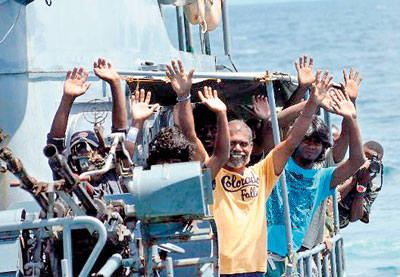 |
| Coming home: The rescued Sri Lankan crew |
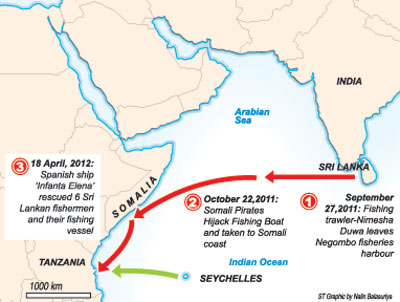 |
The drama started on October 22 the same year. The group had been at sea just under a month, with the boat already loaded with a healthy catch. The skipper had indicated turning around to head for home the next day.
"It was shortly before daybreak, fisherman Jude Nishantha was at the Quartermaster's wheel, while the remaining crew was asleep, when all of a sudden; there were strange sounds close to the boat.
"At first, I thought the sound was coming from the engine and rushed to the upper area of the boat. I froze in my tracks, for standing behind Nishantha were a group of heavily armed men (13 in number) who we were soon to find out were the notorious Somali pirates,” said Lyon Rodrigo, a father of one.
"Later, at gunpoint, we were all frog-marched onto the deck with our hands held high in the air. Then the pirates ordered us to change course and head for the Somali coast, and this was the start of the ordeal that was to last a little over six months.
"There have been erroneous media reports that we had strayed into Somali waters, which was not true. We were in international maritime waters when they hijacked us, from where it took us 13 days to reach the Somali coast."
"On reaching the Somali coast, they kept us onboard and fed us only with Cummin Seed (Suduru) soup and plain rice, along with a tiny ration of drinking water. This was the only food we received during our entire period in captivity.
"Two weeks after reaching the Somali coast, the pirates broke silence and spoke on the mobile phone with the owner of the boat, S. Anthony Michael, and demanded US$ 6 million in return for our release and the vessel. Failure to do so was the threat to kill us one by one on a weekly basis."
"The boat owner pleaded with the pirates, saying he did not have that kind of money, as he was a poor man already in the red with local banks and other lending institutions, but the pirates would have nothing of it and repeated their demand over and over again.
"Later, as the days turned into weeks, and weeks into months, the pirates were getting progressively frustrated, and spoke harshly at us, once again threatening to kill us one by one."
Later, they decided to use the Dinesha Duwa as a mother ship to hijack larger vessels, and ordered us to cooperate. We then sailed out of the Somali coast and headed deep into the Arabian sea. After sailing for 1000-plus miles, the engine packed up, setting the vessel adrift, at the mercy of the winds" continued Lyon Rodrigo (27).
"At this point, six pirates left the boat on two rubber dinghies (RFD) and headed back for the Somali coast, while the rest stayed on, as they hunted for a merchant vessel in the area. Then it all happened without a warning,” added Perumal Selvaraj, a fisherman with 30 years experience.
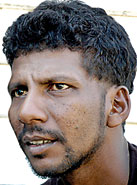 |
| Lyon Rodrigo |
"It was sometime after dusk, when the pirates hurriedly told us to cramp inside the tiny cargo hole and remain there till further notice, because three naval fast boats were approaching the vessel."
"Through a crack in the cargo hole, we could see heavily armed sailors, fair in complexion, draw alongside our boat and begin questioning the pirates, who, rid of their weapons, were claiming to be fishermen."
The sailors, who we later found out to be Spanish naval personnel, had nearly swallowed the lie of the pirates and were preparing to turn away, when we sprang out of the hole and shouted in unison-'We Sri Lanka……..Somali pirates not good', and this was enough," the 45-year-old Selvaraj said.
"In a flash, the sailors moved on to our boat, rounded up the pirates, hand-cuffed them and removed them to the Spanish mother ship 'Infanta Elena' anchored close by. Our ordeal had come to an end. Later, we too were taken onboard the 'Infanta Elena' and treated in a kind and humane manner."
"The Spanish naval personnel fed us with a variety of food and drinks and showered us with cartons of cigarettes, before towing the limping Nimesha Duwa to the closest port of call which was Tanzania."
"We are very, very grateful to the men on the Spanish gunboat. We were later told that they were a part of larger anti-piracy operation launched by the European Union (EU) in the region.
"On reaching Tanzania, our handlers, that included the local police, immigration officials and Sri Lankan diplomats repeatedly questioned all of us on the entire ordeal, and later checked us into a luxury hotel, where we stayed for four nights, before it was time to leave for Sri Lanka.
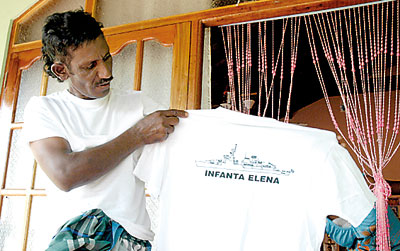 |
| Perumal Selvaraj with a souvenir from the Spanish Navy. Pix by Saman Kariyawasam |
"Prior to our departure, a Sri Lankan Buddhist monk Ven. Ilukpitiye Rannasekera Thera gave us much encouragement and counselling. He was joined by a group of Lankan businessmen there. We are ever so grateful to all these people,” he added.
Neighbourly love and friends in deed
While the drama was unfolding on the high seas, the families of the men onboard the Nimesha Duwa sought divine help for their safe release.
All of them devout Roman Catholics, prayed day in and day out, and towards this end, they were assisted by the priest at the village church in Pitipana, Negombo. So much so that, when the group landed in Colombo on Thursday, they drove directly to the church, before going to their respective homes.
"The church even provided my family with food, while neighbours were kind enough with generous handouts that sometimes included cash, so that my granddaughter would not miss out at the Montessori,” Sujeewa Malkanthi, Lyon Rodrigo's mother-in-law said.
She added that, at present, three families occupy her tiny plank house situated at Dupatha One in Pitipana, Negombo. Their main source of income was from her son-in-law. But now, after all what has happened, he is shattered and reluctant to go out to sea again, which is understandable.
At the end of the line, almost
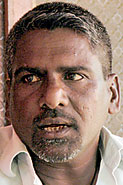 |
| S. Anthony Nihal Fernando and his house that’s up for sale (below) |
The group of six fishermen, suffer as they did at the hands of the Somali pirates, are matched by another man, who is perhaps the worst affected from all this. He is the owner of the boat, who is, today, in the doldrums.
S. Anthony Nihal Fernando who is today, in the red, to banks, to the tune of Rs. 5 million, and has, as a last resort, put his house up for sale.
"I have lost my boat which was purchased with bank loans, and had to see to the welfare of the families of the six men, such as providing assistance, both in cash and kind, and even paying house rentals in some cases."
"I have made repeated appeals to the Fisheries authorities to help me out, as I was a victim of circumstances, but the response, if any, has been poor."
"My entire world came crashing down around me on January 4.
It was around 11.30 pm, when a member of the crew spoke to me over the phone and said- 'Nihal aiya, Somali karayo Nimesha Duwa elluwa'.
And then a pirate spoke to me and made the absurd demand, the rest is now all known,” he said.
Help! We’re almost destitute
The National Union of Seafarers, Dockers and Fishermen Sri Lanka (NUSDFS) has sought the assistance of its counterparts in Europe, Asia and elsewhere, to provide relief for the six Negombo fishermen who were rescued by Spanish marines two weeks ago.
“It was their heroic action, at the risk of their own lives, to alert the marines who had neared the Nimesha Duwa craft, thereby leading to a major breakthrough in the international fight against Somali pirates.
“This should be treated as the single largest blow to the pirates who are a menace to the maritime movements in the corridor of the Arabian Sea where, even at present, there are another eight Sri Lankan Seafarers being held hostage, along with dozens of others from various countries, in the pirate stronghold of Garang,” NUSS President Palitha Athukorale said yesterday.
“We have found that the fishermen involved in this drama live in abject poverty and their position has worsened in the last six months they were held in captivity, with their families forced to borrow for their survival.”
“This group deserves international attention and assistance for their action, as it goes to demonstrate that the present fight against piracy could be won,” Mr. Athukorale added.
Meanwhile, a senior naval official said that the group of six had taken a risk by sailing into deep seas but, on the other hand, they were within legitimate maritime boundaries.
“The operation by the Spanish marines was commendable and was a message to the Somali pirates that they cannot rule the waves unchallenged,” Navy Spokesman Kosala Warnkulasuriya said.
The issue of Somali pirates was discussed extensively at the recently concluded “Galle Dialogue” held last year, where Colombo urged the global community to band together to rid this menace from the seas.
Independent media shut out at BIA
The bulk of the independent media was prevented from covering the arrival of the six Sri Lankan fishermen at Bandaranaike International Airport (BIA) on Thursday morning, 10 days after their rescue by Spanish marines.
The media was informed by a Fisheries ministry official at the BIA that there were orders to prevent them from the coverage, since they were hostile in opinion to Fisheries Minister Dr. Rajitha Senaratne.
Those locked out included a BBC team and an official photographer from the European Union (EU) Office based in Colombo. Incidentally, the Spanish marines who rescued the fishermen were part of a larger EU operation against Somali pirates.
Not only that, it was the EU office in Tanzania that provided backup relief and facilitated the fishermen's return to the country.
The other print media to be shut out were the Sinhalese Language dailies Lankadeepa, Divaina, Lakbima, Maubima Ada and the English Language Ceylon Today and The Island.
Those allowed access to the coverage were the pro-government ITN and Rupavahini television stations and the Sinhalese Language broadsheet Rivira. |







